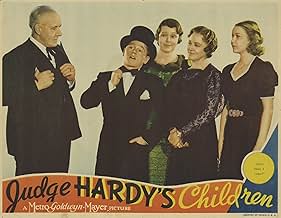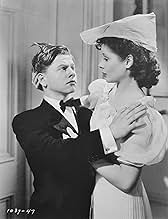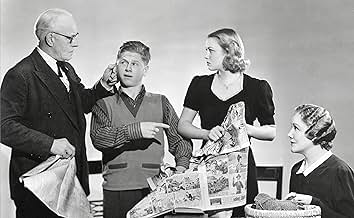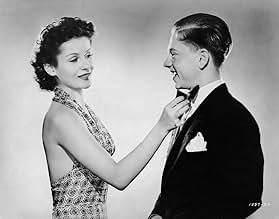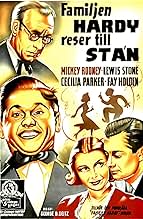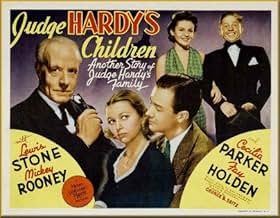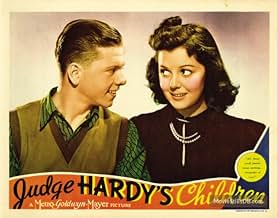Judge Hardy takes a business trip to Washington, DC, where Andy promptly falls for the French ambassador's daughter.Judge Hardy takes a business trip to Washington, DC, where Andy promptly falls for the French ambassador's daughter.Judge Hardy takes a business trip to Washington, DC, where Andy promptly falls for the French ambassador's daughter.
- Director
- Writers
- Stars
Erville Alderson
- Deputy Sheriff
- (uncredited)
Sunny Brooks
- Orchestra Leader
- (uncredited)
Donald Douglas
- J.J. Harper
- (uncredited)
Edward Earle
- Penniwill, Hotel Manager
- (uncredited)
Sarah Edwards
- Miss Adams, Cotillion Hostess
- (uncredited)
- Director
- Writers
- All cast & crew
- Production, box office & more at IMDbPro
Featured reviews
Third entry in MGM's wonderful Hardy series has Judge Hardy (Lewis Stone) taking the family to Washington DC. The Judge has been hired by the federal government to preside over a commission investigating utility monopolies. Soon he learns all about Washington's ugly side when lobbyists use the words of his daughter Marian (Cecilia Parker) to blackmail him. Meanwhile, Andy (Mickey Rooney) falls for a French diplomat's daughter.
Lewis Stone is good as the stoic Judge, but Mickey Rooney is the scene stealer. He brings boundless enthusiasm and humor to the picture but he also handles the dramatic moments quite well. He really was one of the all-time greats. In one of the movie's best scenes, he shows a bunch of rich kids how to do the Big Apple. My favorite moments from this series were the great father-son talks Stone and Rooney had. They have a couple here, one where Judge takes Andy to visit Washington landmarks and lectures him on rebellion and another where Andy unintentionally helps a defeated Judge figure out how to fight back against a frame-up.
Fay Holden is extremely likable as the somewhat addled Mrs. Hardy. Her best moment comes when she and the Judge talk about a time when Andy had diphtheria as a baby and almost died, followed shortly after by her father passing. These little sentimental moments are the kinds of things MGM did so well, particularly in this series. Cecilia Parker has the unenviable job of playing the most flawed Hardy, Marian. Some modern viewers might like her character the most because she was so flawed but she's easily my least favorite and I can't help but think part of that is due to Parker's performance. Marian and Andy make similar mistakes in this one but where Rooney makes Andy rootable, Parker's Marian comes across as difficult and petulant. Betty Ross Clarke makes the first of two appearances as Aunt Millie. I'm not sure why Sara Haden missed these two but she would return to the cast in Out West with the Hardys. Adorable Ann Rutherford shines in her few scenes ("Don't you ever think of anything else but grabbing people in dark corners and kissing them?"). Nice support from Jonathan Hale and Ruth Hussey as the villainous lobbyists.
An enjoyable entry in the series, mixing comedy and drama with a heaping dose of life lessons. Some of the issues examined here are patriotism, insurrection, and putting on airs to impress people. Judge Hardy does a fair amount of soapboxing, per usual. Many today won't care for what he has to say. Heck many back then probably didn't. But these sorts of views, be they old fashioned or not, are never heard in films today. It's one of the many things I find refreshing and even fascinating about this series, and "Louis B. Mayer's America" in general.
Lewis Stone is good as the stoic Judge, but Mickey Rooney is the scene stealer. He brings boundless enthusiasm and humor to the picture but he also handles the dramatic moments quite well. He really was one of the all-time greats. In one of the movie's best scenes, he shows a bunch of rich kids how to do the Big Apple. My favorite moments from this series were the great father-son talks Stone and Rooney had. They have a couple here, one where Judge takes Andy to visit Washington landmarks and lectures him on rebellion and another where Andy unintentionally helps a defeated Judge figure out how to fight back against a frame-up.
Fay Holden is extremely likable as the somewhat addled Mrs. Hardy. Her best moment comes when she and the Judge talk about a time when Andy had diphtheria as a baby and almost died, followed shortly after by her father passing. These little sentimental moments are the kinds of things MGM did so well, particularly in this series. Cecilia Parker has the unenviable job of playing the most flawed Hardy, Marian. Some modern viewers might like her character the most because she was so flawed but she's easily my least favorite and I can't help but think part of that is due to Parker's performance. Marian and Andy make similar mistakes in this one but where Rooney makes Andy rootable, Parker's Marian comes across as difficult and petulant. Betty Ross Clarke makes the first of two appearances as Aunt Millie. I'm not sure why Sara Haden missed these two but she would return to the cast in Out West with the Hardys. Adorable Ann Rutherford shines in her few scenes ("Don't you ever think of anything else but grabbing people in dark corners and kissing them?"). Nice support from Jonathan Hale and Ruth Hussey as the villainous lobbyists.
An enjoyable entry in the series, mixing comedy and drama with a heaping dose of life lessons. Some of the issues examined here are patriotism, insurrection, and putting on airs to impress people. Judge Hardy does a fair amount of soapboxing, per usual. Many today won't care for what he has to say. Heck many back then probably didn't. But these sorts of views, be they old fashioned or not, are never heard in films today. It's one of the many things I find refreshing and even fascinating about this series, and "Louis B. Mayer's America" in general.
Because of an opinion rendered in a case involving public utilities Judge Hardy gets an offer he can't refuse, counsel to a Congressional committee investigating
public utilities. So the whole family gets packed up to Washington, DC where
they get exposed to a far more sophisticated crowd.
This was a very topical topic in those New Deal years with among other things the founding of the Tennessee Valley Authority. Private utility companies resented being put under a microscope. The president of one such company became a candidate for president, that would be Wendell Wilkie. Audiences watching this on TCM can't appreciate that now in the way that ticket buyers could and did.
Judge Hardy's iron integrity and homespun values from Carvel come up against a real DC operator in Jonathan Hale. Even daughter Cecilia Parker who spills some information unknowingly about the investigation gets dragged into a potential scandal.
As for Mickey Rooney he gets involved with the French Ambassador's daughter Jacqueline Laurent and at a cotillion he's invited to shows that crowd what swing and the Big Apple is all about. Chaperone Janet Beecher is not amused.
In the end the whole family thinks that Carvel is the place for them. They sure went back in time for the next Hardy family feature from MGM.
This was a very topical topic in those New Deal years with among other things the founding of the Tennessee Valley Authority. Private utility companies resented being put under a microscope. The president of one such company became a candidate for president, that would be Wendell Wilkie. Audiences watching this on TCM can't appreciate that now in the way that ticket buyers could and did.
Judge Hardy's iron integrity and homespun values from Carvel come up against a real DC operator in Jonathan Hale. Even daughter Cecilia Parker who spills some information unknowingly about the investigation gets dragged into a potential scandal.
As for Mickey Rooney he gets involved with the French Ambassador's daughter Jacqueline Laurent and at a cotillion he's invited to shows that crowd what swing and the Big Apple is all about. Chaperone Janet Beecher is not amused.
In the end the whole family thinks that Carvel is the place for them. They sure went back in time for the next Hardy family feature from MGM.
In the third film in the series, the Hardy family take their act on the road--to Washington D.C. Judge Hardy, being an esteemed jurist, is serving on a commission which is to make a ruling regarding a utility company's monopolistic intentions.
Meanwhile, Andy tries to woo the daughter of the French ambassador, under the constant scrutiny of a dedicated chaperone.
The capital setting provides an opportunity for Judge Hardy to school Andy in the principles of freedom and democracy (as they were commonly perceived in the thirties).
The other Hardy child--Marian (Cecilia Parker)--falls for the sophisticated ways of a questionable crowd, but the judge finds a way to set everything straight, natch.
Meanwhile, Andy tries to woo the daughter of the French ambassador, under the constant scrutiny of a dedicated chaperone.
The capital setting provides an opportunity for Judge Hardy to school Andy in the principles of freedom and democracy (as they were commonly perceived in the thirties).
The other Hardy child--Marian (Cecilia Parker)--falls for the sophisticated ways of a questionable crowd, but the judge finds a way to set everything straight, natch.
JUDGE HARDY'S CHILDREN (Metro-Goldwyn-Mayer, 1938), directed by George B. Seitz, marks the third installment to what was to become relatively known as "The Andy Hardy series." Getting better by this time and a little longer than the previous two entries consisting of A FAMILY AFFAIR (1937) and YOU'RE ONLY YOUNG ONCE (1937), the series still places Lewis Stone's name heading the cast over the scene stealing Mickey Rooney, whose career by this time was reaching its peek with character gathering most of the attention.
The movie opens during the opening credits with a family portrait of the Hardy family, starting from left with Andy (the son); Judge Hardy (father); Emily Hardy (mother); and Marian Hardy (daughter) with "Another story of Judge Hardy's Family" printed above. The photoplay begins in the courtroom with Judge James K. Hardy (Lewis Stone) reading a petition headlined with, "Students of Carvel Arise! Unite! We Refuse to Recite." The students in the courtroom explain their reaction against Superintendent Warwick, but the judge punishes them with a 20,000-word essay to write on the American system of free education. He tells the boys that if his son were the offender, the punishment would be ten times worse. Unknown to the judge, his son, Andrew (Mickey Rooney), is involved in the petition, but it would be a while before Judge Hardy learns of it. Later, the Hardy's go to Washington, D. C., where the judge serves as the chairman of a special Federal Commission investigating the power industry. After the industry's affairs have been resolved, the judge has to solve the problem his daughter, Marian's (Cecilia Parker) after getting herself mixed-up with a couple of lobbyists, Margaret (Ruth Hussey) and John Lee (Jonathan Hale) who get into her confidence and attempt on blackmailing the judge by confronting him with some incriminating statements given to them unwittingly by Marian. As for the teen-age Andy, who has become romantically involved with a French girl named Suzanne Cortot (Jacqueline Laurent), at least for a while anyway, he assists his father with a bright idea to "fight fire with fire" against those blackmailers wanting to get him to resign from the bench or else ruin his reputation.
While Fay Holden resumes her motherly role as Mrs. Hardy, and Ann Rutherford playing Polly Benedict, Andy's girl back home, Sara Haden, the original Aunt Milly Forrest, is replaced (for two installments) by Betsy Ross Clark. Erville Alderson is back for the third time as Dave, the courtroom bailiff, while others in the cast include Ruth Hussey (Margaret Lee); Jonathan Hale (John Lee); Janet Beecher (Miss Budge); Don Douglas (J>J> Harper); and Leonard Penn (Steve Prentiss). Robert Whitney substitutes for Eric Linden (from A FAMILY AFFAIR) as Marion's romantic interest, Wayne Trenton, whose character would soon be written out following this third theatrical installment.
A not-bad family-oriented production that includes one fine moment where father and son learn America's history by going through the Washington, D. C. landmarks, and Andy having his man-to-man talk with his father confessing he being part of the passing the petition with the other boys back home. Though not up to the standards of the episodes that were to follow, JUDGE HARDY'S CHILDREN offers family values and tradition in the MGM style from the days gone by.
Never distributed to video cassette, JUDGE HARDY'S CHILDREN often plays on cable television's Turner Classic Movies. Next installment, LOVE FINDS ANDY HARDY (1938), hailed by many the very best and known of all the "Andy Hardy" editions, possibly due to more Andy Hardy's antics, and the supporting cast of young starlets on the rise, Judy Garland and Lana Turner. (***)
The movie opens during the opening credits with a family portrait of the Hardy family, starting from left with Andy (the son); Judge Hardy (father); Emily Hardy (mother); and Marian Hardy (daughter) with "Another story of Judge Hardy's Family" printed above. The photoplay begins in the courtroom with Judge James K. Hardy (Lewis Stone) reading a petition headlined with, "Students of Carvel Arise! Unite! We Refuse to Recite." The students in the courtroom explain their reaction against Superintendent Warwick, but the judge punishes them with a 20,000-word essay to write on the American system of free education. He tells the boys that if his son were the offender, the punishment would be ten times worse. Unknown to the judge, his son, Andrew (Mickey Rooney), is involved in the petition, but it would be a while before Judge Hardy learns of it. Later, the Hardy's go to Washington, D. C., where the judge serves as the chairman of a special Federal Commission investigating the power industry. After the industry's affairs have been resolved, the judge has to solve the problem his daughter, Marian's (Cecilia Parker) after getting herself mixed-up with a couple of lobbyists, Margaret (Ruth Hussey) and John Lee (Jonathan Hale) who get into her confidence and attempt on blackmailing the judge by confronting him with some incriminating statements given to them unwittingly by Marian. As for the teen-age Andy, who has become romantically involved with a French girl named Suzanne Cortot (Jacqueline Laurent), at least for a while anyway, he assists his father with a bright idea to "fight fire with fire" against those blackmailers wanting to get him to resign from the bench or else ruin his reputation.
While Fay Holden resumes her motherly role as Mrs. Hardy, and Ann Rutherford playing Polly Benedict, Andy's girl back home, Sara Haden, the original Aunt Milly Forrest, is replaced (for two installments) by Betsy Ross Clark. Erville Alderson is back for the third time as Dave, the courtroom bailiff, while others in the cast include Ruth Hussey (Margaret Lee); Jonathan Hale (John Lee); Janet Beecher (Miss Budge); Don Douglas (J>J> Harper); and Leonard Penn (Steve Prentiss). Robert Whitney substitutes for Eric Linden (from A FAMILY AFFAIR) as Marion's romantic interest, Wayne Trenton, whose character would soon be written out following this third theatrical installment.
A not-bad family-oriented production that includes one fine moment where father and son learn America's history by going through the Washington, D. C. landmarks, and Andy having his man-to-man talk with his father confessing he being part of the passing the petition with the other boys back home. Though not up to the standards of the episodes that were to follow, JUDGE HARDY'S CHILDREN offers family values and tradition in the MGM style from the days gone by.
Never distributed to video cassette, JUDGE HARDY'S CHILDREN often plays on cable television's Turner Classic Movies. Next installment, LOVE FINDS ANDY HARDY (1938), hailed by many the very best and known of all the "Andy Hardy" editions, possibly due to more Andy Hardy's antics, and the supporting cast of young starlets on the rise, Judy Garland and Lana Turner. (***)
It's the third movie in the Hardy family saga. Judge Hardy (Lewis Stone) has been recruited to chair a committee in Washington. His daughter Marian (Cecilia Parker) is taken with the high society. His son Andy (Mickey Rooney) falls for a French diplomat's daughter.
The family foursome has returned for this installment. The kids get into romantic troubles. Father still knows best. There is a dash of politics considering the Washington location. It does stay in the patriotic mainstream of its day. It is Rockwellian middle America. Rooney does a bit of toe tapping and swinging. It is strictly coloring within the lines and the actors' return really helps.
The family foursome has returned for this installment. The kids get into romantic troubles. Father still knows best. There is a dash of politics considering the Washington location. It does stay in the patriotic mainstream of its day. It is Rockwellian middle America. Rooney does a bit of toe tapping and swinging. It is strictly coloring within the lines and the actors' return really helps.
Did you know
- TriviaThe third of 16 Andy Hardy films starring Mickey Rooney.
- ConnectionsFollowed by L'amour frappe André Hardy (1938)
Details
- Release date
- Country of origin
- Language
- Also known as
- Otroci sodnika Hardyja
- Filming locations
- Production company
- See more company credits at IMDbPro
- Runtime
- 1h 18m(78 min)
- Color
- Aspect ratio
- 1.37 : 1
Contribute to this page
Suggest an edit or add missing content

